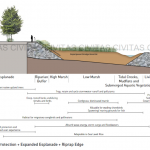
Even If You Don’t Live in the Midwest, This Spring’s Floods Could Still Impact You
From enduring drought to intense floods, agriculture is particularly sensitive and vulnerable to changes in our climate

From enduring drought to intense floods, agriculture is particularly sensitive and vulnerable to changes in our climate

Any New York City history buff can tell you how closely the city’s fortunes are intertwined with the rivers and estuaries that snake around the five boroughs. Manhattan alone has 32 miles of coastline, but public access to that waterfront has fallen under the shadow of expressways on both the east and west sides of the island.
In 2017, New York’s waterways are a shadow of what they once were, and that could spell disaster.

Growing up, I never knew what mangroves were. In fact, whenever someone mentioned them, I thought they were talking about mangos. But of course they’re not tropical fruit. They’re coastal plants that live in the transition zone between the ocean and land and offer a wealth of services for both people and the environment. They are crucial in the fight against climate change.

As it marches on, climate change will bring forth higher temperatures, more frequent and severe flooding and a greater level of unpredictability to the climate system. New York may seem resilient to climate change, but the modern Goliath has its weaknesses.